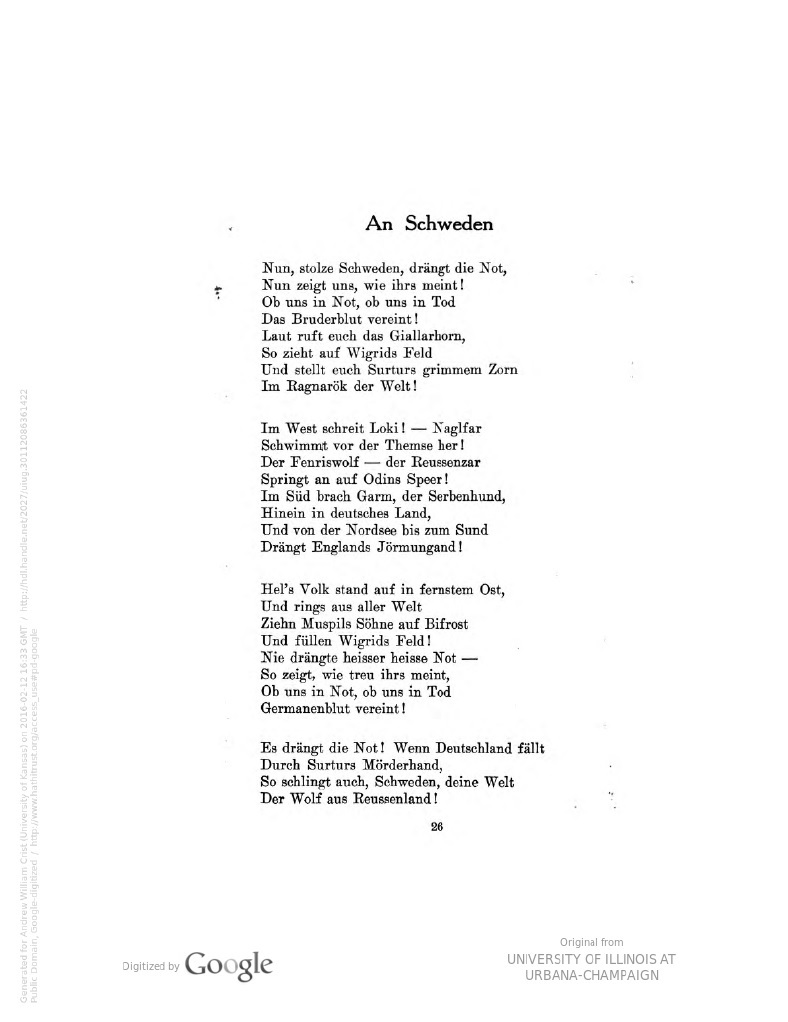WWI American
Immigrant Poetry

Nun, stolze Schweden, drängt die Not,
Nun zeigt uns, wie ihrs meint!
Ob uns in Not, ob uns in Tod
Das Bruderblut vereint!
Laut ruft euch das Giallarhorn,
So zieht auf Wigrids Feld
Und stellt euch Surturs grimmem Zorn
Im Ragnarök der Welt!
Im Weit schreit Loki! — Naglfar
Schwimmt vor der Themse her!
Der Fenriswolf — der Reussenzar
Springt an auf Odins Speer!
Im Süd brach Garm, der Serbenhund,
Hinein in deutsches Land,
Und von der Nordsee bis zum Sund
Drängt Englands Jörmungand!
Hel’s Volk stand auf in fernstem Ost,
Und rings aus aller Welt
Ziehn Muspils Söhne auf Bifrost
Und füllen Wigrids Feld!
Nie drängte heisser heisse Not —
So zeigt, wie treu ihrs meint,
Ob uns in Not, ob uns in Tod
Germanenblut vereint!
Es drängt die Not! Wenn Deutschland fällt
Durch Surturs Mörderhand,
So schlingt auch, Schweden, deine Welt
Der Wolf aus Reussenland!
Der Wolf, der deine Lande stahl,
Der Ingermanland nahm!
Gedenk an Finlands bittre Qual,
Gedenk an Esthlands Scham!
Und, Schweden, denk an Warschaus Streit,
Wie dein Karl Gustav ritt
Und, Sieg im Herzen, Seit an Seit
Dem grossen Kurfürst stritt.
Wie Karls des Zwölften Löwenmut
Sich schlug in Narwa’s Thal!
Ein Held von bestem deutschem Blut,
Ein Arm von Schwedenstahl!
Schon einmal schlug an Schwedens Ohr
Ein Notruf von der Spree,
Da reckt’ dein Wasa sich empor
Und schwamm durch Nordlands See!
Da brach in heissen Völkerkrieg
Dein Gustav Adolf ein,
Schrieb Schwedens Ruhm mit manchem Sieg
Ins Weltenbuch hinein!
Doch lauter ruft Giallar’s Horn
Euch heut auf Wigrids Feld,
So stellt euch Surturs grimmem Zorn
Im Ragnarök der Welt!
Nie drängte heisser heisse Not,
So zeigt, wie treu ihrs meint,
Ob uns in Not, ob uns in Tod
Das Bruderblut vereint!